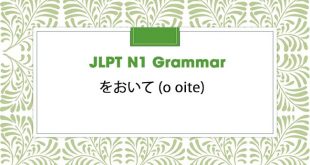を踏まえて (o fumaete) Meaning: based on How to use the: Noun + を踏まえ / を踏まえて Explain: Using just the matter of considering something is based on some judgment or premise. Example sentences: 1, 今の山田さんの報告を踏まえて話し合っていただきたいと思います。 Ima no Yamada-san no hōkoku o fumaete hanashiatte itadakitai to omoimasu. I would like you to …
Read More »Grammar
JLPT N1 Grammar: を限りに (o kagiri ni)
を限りに (o kagiri ni) Meaning: starting from…; to the full extent of How to use the: Noun + を限りに/限りで Explain: Used with the idea that N is the last time for something. N here is N time like 「今日」、「今回」など。。。 Example sentences: 1, 今日を限りに今までのことはきれいさっぱり忘れよう。 Kyō o kagiri ni ima made no …
Read More »JLPT N1 Grammar: をおいて (o oite)
をおいて (o oite) Meaning: other than How to use the: Noun + をおいて Explain: Used with the meaning N to be unique to an action / thing. Particularly, the phrase [何をおいても] means “no matter what situation / situation” Example sentences: 1, 都市計画について相談するなら、彼をおいて他にはいないだろうか。 Toshi keikaku ni tsuite sōdan surunara, kare o …
Read More »JLPT N1 Grammar: ようによっては (you ni yotte wa)
ようによっては (you ni yotte wa) Meaning: depending on How to use the: Verb-ますstem + ようによっては Explain: Used with the intention of each method, the views will produce different results. Example sentences: 1, 考えようによっては、彼等の人生も幸せだったと言えるのかもしれない。 Kangae you ni yotte wa, karera no jinsei mo shiawasedatta to ieru no kamo shirenai. Depending on …
Read More »JLPT N1 Grammar: や否や (ya ina ya)
や否や (ya ina ya) Meaning: the moment that; no sooner than; as soon as How to use the: Verb-dictionary form + や/や否や Explain: Use only certain conditions that occur immediately or only occur shortly after an action. Example sentences: 1, 彼はそれを聞くや否や、ものも言わずに立ち去った。 Kare wa sore o kiku ya ina ya, mono …
Read More »JLPT N1 Grammar: もさることながら (mo saru koto nagara)
もさることながら (mo saru koto nagara) Meaning: not only… but also… How to use the: Noun 1 + もさることながら + Noun 2 Explain: Describe “A certainly, not only that B”. Often used for things that are well appreciated. Example sentences: 1, 彼は、大学の成績もさることながら、スポーツ万能で親孝行という申し分のない息子だ。 Kare wa, daigaku no seiseki mo saru koto nagara, …
Read More »JLPT N1 Grammar: までもない (made mo nai)
までもない (made mo nai) Meaning: it’s not necessary to How to use the: Verb-dictionary form + までもない Explain: Not to the point, no need Example sentences: 1, 引っ越しといっても荷物をあまり多くないから手伝いに行くまでもないだろう。 Hikkoshi to itte mo nimotsu o amari ōkunaikara tetsudai ni iku made mo naidarou. Even if you move, you don’t have a …
Read More »JLPT N1 Grammar: べくもない (beku mo nai)
べくもない (beku mo nai) Meaning: can’t; cannot possibly be How to use the: Verb-dictionary form + べくもない Exception: する -> すべくもない Explain: It means 「~することは、とてもできない」 (the work … is impossible) Example sentences: 1, 優勝は望むべくもない。 Yūshō wa nozomubeku mo nai. Can’t hope to win 2, 嵐とは比べるべくもないが、ビッグバンは日本ではかなり有名なバンドです。 arashi towa kuraberu beku mo …
Read More »JLPT N1 Grammar: 羽目になる (hame ni naru)
羽目になる (hame ni naru) Meaning: to end up with (something unpleasant) How to use the: Verb-dictionary form + 羽目になる Explain: The meaning becomes, becomes a bad situation, expressing the fact that the results become difficult beyond expectation for some reason. Example sentences: 1, 歩い中に運で、入院する羽目になった。 Arui naka ni un de, nyūin …
Read More »JLPT N1 Grammar: ばそれまでだ (ba sore made da)
ばそれまでだ (ba sore made da) Meaning: if… then it’s over (nothing will be of use) (If something occurs, then a bad end is reached.) How to use the: Verb-ばconditional + それまでだ Explain: There is no other suitable way, to do so, it can’t be helped Demonstrate determination of the speaker …
Read More » Learn Japanese Free Learn Japanese Free
Learn Japanese Free Learn Japanese Free










